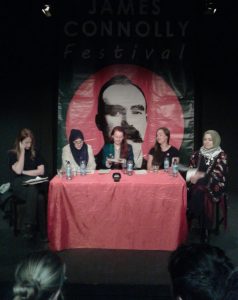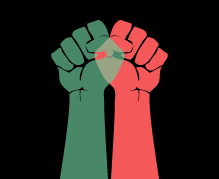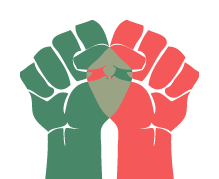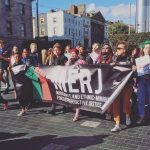 “I’m a member of MERJ. We are Migrants and Ethnic minorities for Reproductive Justice because we know that the struggle for ‘women’s rights’ in Ireland didn’t end last May with a YES vote. Reproductive Justice is broad and our approach to it intersectional because as Audre Lorde said, “We don’t live single issue lives”. Reproductive Justice includes issues of sexual and reproductive healthcare, but it also includes housing and work, including sex work and including unpaid labour. It includes race, migration, ecology, access, gender, gender-based violence, the carceral state (so prisons and policing, direct provision for example). Reproductive Justice to us is also about liberation, creativity and building communities of resistance. It’s about love and sex–consent, but also pleasure. And it is at its core anti-capitalist.
“I’m a member of MERJ. We are Migrants and Ethnic minorities for Reproductive Justice because we know that the struggle for ‘women’s rights’ in Ireland didn’t end last May with a YES vote. Reproductive Justice is broad and our approach to it intersectional because as Audre Lorde said, “We don’t live single issue lives”. Reproductive Justice includes issues of sexual and reproductive healthcare, but it also includes housing and work, including sex work and including unpaid labour. It includes race, migration, ecology, access, gender, gender-based violence, the carceral state (so prisons and policing, direct provision for example). Reproductive Justice to us is also about liberation, creativity and building communities of resistance. It’s about love and sex–consent, but also pleasure. And it is at its core anti-capitalist.
Everything is reproductive justice. It’s how we understand the world. It’s our lives. We are looking to confront patriarchy and racialised capitalism by fundamentally changing how we value reproductive labour in our society, in our communities and in our homes AND especially within our political spaces.
We are proud intersectional feminists, though the term seems to have been rendered meaningless these days. It’s become the source of much derision from many white, male, so-called comrades just as it has been co-opted by white feminists, both of whom wholly misunderstand the concept. It’s simply a framework through which we approach justice and analyse power. People often mistake it for solidarity, which is sadly also lacking when it becomes inconvenient.
So, tonight I want us to talk about politics and about how we organise. I want to talk about what we value and why. I want to talk about what a win looks like and why HOW we get there is critical. Let’s start by looking at where we are.
This talk is specifically about women, power and politics in the 21st century but as it’s the 21st century, I want to extend that to include trans and non-binary people as well. What do we specifically bring to politics as women, trans and non-binary people? First, we need to think about what we mean when we say politics. Politics is not just elections. Equally, politics is not just demos and direct action. If we want real change, we need to organise as well as mobilise. Organising is less sexy and less valued than mobilisation partly because it requires more nurturing and care and is therefore feminised while, speechifying is seen as more important and masculine. Organising is unsung and quiet but wholly necessary if we want to build sustainable movements that last beyond election day.
I also believe that our organising and our movements need to reflect the politics we espouse. In this way intentional organising becomes a political act in and of itself. In MERJ we have a set of principles that we always come back to that informs our work. There is a difference, however, between being principled and being puritanical. Principles are not just lofty ideals, they exist for a very pragmatic reason. They exist so that in times of stress and exhaustion, in the middle of a campaign or an action, when we are too tired to think, they can serve as a guide. And truly what is the point of having principles when it is easy if you don’t hold to them when it is hard?
I think it’s also important for our movements to be grassroots and non-hierarchical (from the ground up instead of top down). As Ella Baker said, “Strong people don’t need strong leaders,” meaning we are all capable of being leaders and we don’t need to wait for an authority on high to tell us how to act. This is not always easy or expedient, but it will build stronger, more dynamic movements in the long run. It is also practical because, to paraphrase Fred Hampton, “you can kill a revolutionary, but you can’t kill a revolution.” If our movements are centred on the voice of one or even a handful of charismatic leaders, what happens when they’re gone?
We also need to be open and inclusive, which means stop gate keeping the left and start bringing people along. We need to be done with a political culture that is exclusive and cliquish and macho. We need to rethink what it means to be an ‘expert’ and value community knowledge as much as academic knowledge. We need to give people a chance to come into their political analysis through the struggle, not just through books and ‘in’ language. And we especially need to open up our definition of working class to include women and minorities, citizens and non-citizens. Value our work. Understand that just because you don’t know about the work we are doing in our communities, it doesn’t mean that work is not happening. Stop writing off everything that’s not about you or that makes you feel uncomfortable as pejoratively Politically Correct. There is a difference between being PC and just being sound. We don’t strive for inclusivity to be PC, we do it because it is strategic and because we can see past our own noses. While we are organising for the present, we are laying the groundwork for future movements and revolution. Last year Together for Yes failed to learn the lessons of history and repeated the same exclusion as the suffragettes 100 years earlier. We will be paying the price for years to come because of it.
And back to the question what do we bring to politics? What do I bring as a woman, mixed race, woman of colour, an outsider? What do we bring collectively? We bring the ability to see and hear things men cannot. We bring nuance. The ability to see past black and white thinking of the enemy of my enemy is my friend. The ability to be reactive without being reactionary.
The ability to see global politics and politics on smaller scales including in the workplace, school and home as interconnected. We bring varied experiences from other cultures and contexts. We bring thoughtfulness to complex issues. We bring anger and we bring care. Value our work and our struggle though it may at first glance look different to your own.
Lastly, I want to read MERJ’s message of solidarity with and gratitude for the women engaged in the struggle all over the world for constantly challenging and inspiring us:
We stand in solidarity with and in awe of the women leading the Sudan Uprising. We stand with our Kurdish sisters in Rojava fighting fascism as well as building and re-building their communities with the YPJ. We stand with the women of Palestine living and resisting Israeli occupation, We stand with our sisters and siblings fighting for abortion rights in South Korea, Argentina and all around the world, including the North of Ireland. It is a struggle we know all too well. We stand with Zapatista women, land defenders and all indigenous people. We stand with the women leading the teachers strikes across the US. We stand with women in India who are fiercely fighting gender-based violence. We stand with comrades in my hometown who have chained themselves to the Durham County Jail to make sure no more Black mothers will be jailed over mother’s day. We stand with all women, trans and non-binary people around the world who are standing up and fighting back, while at the same time reproducing society and transforming communities and the world. A luta continua!”





